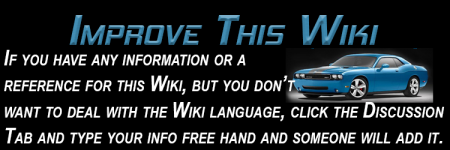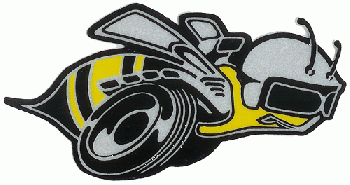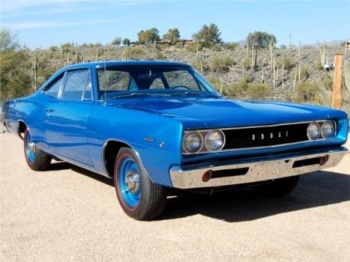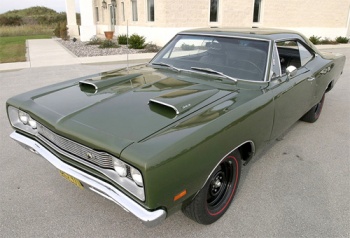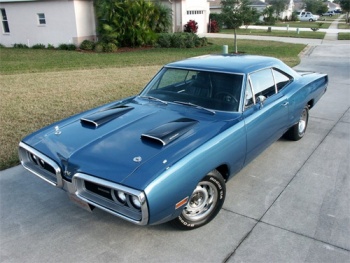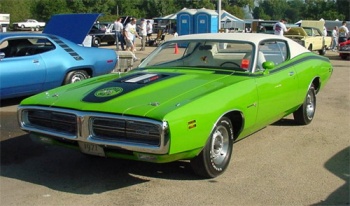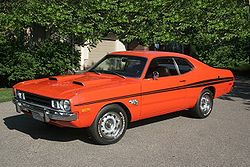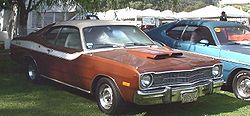Difference between revisions of "Super Bee"
Old Hippie (talk | contribs) |
|||
| (133 intermediate revisions by 5 users not shown) | |||
| Line 1: | Line 1: | ||
| − | + | [[Category:Models|Super Bee]] | |
| − | + | [[Category:Dodge]] | |
| − | + | {{Template:TopWiki}} | |
| + | [[Image:SuperBeeDecal.gif|thumb|350px|Super Bee Logo]] | ||
| + | [[Image:68bee-1-.jpg|thumb|350px|1968 1/2 Super Bee]] | ||
| + | [[Image:69bee-1-.jpg|thumb|350px|1969 Super Bee]] | ||
| + | [[Image:70 Bee-1-.jpg|1970 Dodge Super Bee|thumb|350px|1970 Super Bee]] | ||
| + | [[Image:71 Bee-pjg.jpg|thumb|350px|1971 Dodge Super Bee]] | ||
'''ALL BUZZ NO BEEP BEEP''' | '''ALL BUZZ NO BEEP BEEP''' | ||
| − | |||
| − | |||
| − | |||
== [[Background:]] == | == [[Background:]] == | ||
<!-- One or two Paragraphs to skim over the big picture --> | <!-- One or two Paragraphs to skim over the big picture --> | ||
| + | The [[Dodge]] Super Bee followed after the creation of [[Plymouth]]'s successful [[Roadrunner]] With the chief difference's being the use of available tail stripes or available "C" stripe in 1970 only, classy wheel lip moldings and the incorporation of [[Charger]]'s [[Ralleye instrument cluster]]. All of these were standard equipment. The nifty [[tic toc tac]] was an option to compliment the gauges. | ||
| − | + | Super Bee's had a standard "[[power bulge]]" hood to set apart from other [[Coronet]]s. In 69 & 70, distinctive Ram Charger hood scoops were offered as well. Super Bee's used the mid line Coronet trim level so they always had carpet & never a "taxi cab" interior. 1968 used 2dr coupes only adding 2 dr [[hardtop]] as well in 1969, and unlike [[Road Runner]] never a [[convertible]]. | |
| − | + | The 383 4 bbl Magnum was the standard engine with 335 hp, however cars w/ air conditioning had a 330hp engine. A 426 [[Hemi]] with 425 hp was the only engine option in 1968. In 1969 a 440 [[6 pack]] was offered using 3-2 bbls & 4.10 axle ratio. In 1971, the 383 was detuned hp wise to 300 hp while a 340 was also offered. A [[4-speed]] was the standard [[transmission]] in 1968-69 while 3-spd was entry level starting 1970. | |
| − | |||
| − | The 383 4 bbl Magnum was the standard engine with 335 hp | ||
<!-- Please site your information references when applicable. There is a "Editing Help" link at the bottom of the page for people new to Wikis. Editing is actually very easy --> | <!-- Please site your information references when applicable. There is a "Editing Help" link at the bottom of the page for people new to Wikis. Editing is actually very easy --> | ||
| + | == [[History:]] == | ||
| − | + | In 1968 the two MOPAR divisions, Dodge and Plymouth, began to engage in a bit of sibling rivalry. The result was the Dodge [[SuperBee]], a direct competitor to Plymouth's Road Runner. Although a capable budget muscle car, it never was as successful as the Road Runner. The original Super Bee was based on the Dodge Coronet. It was a two-door coupe model only 1968 through 1970. It was the company's low-priced muscle car. The Super Bee included a [[heavy-duty suspension]], an optional Mopar [[A-833 four-speed]] and high-performance tires. Outside, a stripe (with the bee logo) was wrapped around the tail. The 1968 model only came as a two-door coupe and two engine options, the base 335 hp 383 Magnum,& the 426 Hemi rated at 425 hp. | |
| − | A hardtop version joined the existing pillared coupe body for 1969, and a new optional twin-scooped air induction hood was now available and became known as the | + | A hardtop version joined the existing pillared coupe body for 1969, and a new optional twin-scooped air induction hood was now available and became known as the [[Ramcharger]]. This particular option was coded N-96 and was the counterpart to the Plymouth Road Runner's [[Coyote Duster]] air induction hood. A "six-pack" (three two-barrel carburetors) version of Dodge's 440 cubic inch engine was added to the offering list mid-year. This option fell half-way between the standard engine and the Hemi. The 1969 model year gave Chrysler customers several engines to choose from. The base 383 hp (high performance), [[440 Six Pack]], and the [[426 Hemi]]. |
| + | 1970 the Super Bee received a cosmetic redesign and was given a new front end that consisted of a twin-looped front bumper that Dodge PR referred to as "bumble bee wings". The engine choices, as well as the "ramcharger" hood carried over from 1969. The 1970 cars from Dodge were chock-full of new and improved options; for example: a "double [[hockey stick stripe]]" variant of the bumble stripe was offered in addition to new high-back bucket seats, steering column-mounted ignition as well as a "[[pistol-grip]]" Hurst shifter on four-speed models. In 1970, Dodge also produced four Super Bee convertibles; the whereabouts of the four cars are unknown. | ||
| − | 1970 the Super Bee | + | The 1968 through 1970 would be known as the '''First Generation''' Super Bee |
| − | + | ||
| + | In 1971 the Super Bee model was moved to the Charger platform. Since the Charger already had an R/T muscle car version, the Super Bee was slotted in as the low-priced entry in the line. | ||
| + | 1971 was the first and only year that a small block engine[[ (340 4-bbl)]] became available in the Super Bee | ||
| + | Although the [[440 Magnum (4-bbl)]] was not an available option on the Super Bee for 1971, 26 are known to have been built. | ||
| + | |||
| + | This was the '''Second generation''' Super Bee | ||
<!-- Background. If the make or model spans decades, then make each decade (IE:1930-1940) a Level Two Headline. --> | <!-- Background. If the make or model spans decades, then make each decade (IE:1930-1940) a Level Two Headline. --> | ||
| − | + | === [[Model Predecessor]] === | |
| − | |||
| − | |||
| − | |||
| − | |||
| − | === [[Model Predecessor]] === | ||
| − | |||
| − | |||
| − | |||
| − | |||
| − | |||
=== [[Model Successor]] === | === [[Model Successor]] === | ||
| + | === [[Export Versions]] === | ||
| + | Around 1970, the Mexican-market Dodge [[Dart]] had a Super Bee package; Super Bees were based on the [[Demon]]/[[Dart Sport]] semi-fastback Mopar A platform until 1976, and the F platform (based on the Dodge Aspen coupe) between 1977–79 (sold in Mexico as part of the Dodge [[Valiant]] [[Volare]] series). | ||
| + | These were First Generation Mexican Super Bee | ||
| + | |||
| + | ==== '''1973 Mexican Super Bee''' ==== | ||
| + | |||
| + | [[Image:250px-1973mexicansuperbee-1-.jpg|thumb|350px|Mexican Super Bee]] | ||
| + | '''Production 1970–1976''' | ||
| + | * Assembly Toluca, Mexico | ||
| + | * Body style(s) 2-door coupe | ||
| + | * Platform '''A-body''' | ||
| + | * Engine(s) | ||
| + | ** 318 in LA V8 (1970-1973 | ||
| + | ** 360 in LA V8 (1974-1976 | ||
| + | * Transmission(s) | ||
| + | ** 4-speed manual | ||
| + | ** Torqueflite automatic | ||
| + | * Wheelbase 108.0 in | ||
| + | * Length 192.5 in | ||
| + | * Width 71.6 in | ||
| + | * Height 54.0 in | ||
| + | * Related | ||
| + | ** Plymouth Valiant | ||
| + | ** Chrysler Valiant | ||
| + | ** Dodge Dart | ||
| − | === | + | ==== '''1974 Mexican Super Bee''' ==== |
| − | + | [[Image:250px-1974 superbee mexico-1-.jpg|thumb|350px|Mexican Super Bee]] | |
| − | + | ==== '''Second Generation Mexican''' Super Bee ==== | |
| − | + | '''Production 1976–1980 ...''' | |
| − | + | * Assembly Toluca, Mexico... | |
| − | + | * Body style(s) 2-door coupe... | |
| − | + | * Platform '''F-body''' .... | |
| − | + | * Engine(s) | |
| − | + | ** 360 in LA V8 .... | |
| − | + | * Transmission(s) | |
| − | + | ** 4-speed manual.... | |
| − | + | ** TorqueFlite automatic .... | |
| − | + | * Wheelbase 108.7 in ... | |
| − | + | * Length 198.8 in.... | |
| − | + | * Width 73.3 in.... | |
| − | + | * Height 53.3 in... | |
| − | + | * Related | |
| − | + | ** Dodge Aspen | |
| − | Production 1976–1980 ... | + | ** Plymouth Volare |
| − | Assembly Toluca, Mexico... | ||
| − | Body style(s) 2-door coupe ... | ||
| − | Platform F-body .... | ||
| − | Engine(s) | ||
| − | 360 | ||
| − | Transmission(s) 4-speed manual... | ||
| − | TorqueFlite automatic... | ||
| − | Wheelbase 108.7 in | ||
| − | Length 198.8 in .... | ||
| − | Width 73.3 in .... | ||
| − | Height 53.3 in | ||
| − | Related Dodge Aspen | ||
| − | Plymouth Volare | ||
=== [[Related Models]] === | === [[Related Models]] === | ||
| − | |||
* Dodge Coronet R/T | * Dodge Coronet R/T | ||
| Line 94: | Line 103: | ||
* Plymouth Road Runner | * Plymouth Road Runner | ||
* Dodge Charger | * Dodge Charger | ||
| − | |||
| − | |||
=== [[Competition]] === | === [[Competition]] === | ||
| Line 106: | Line 113: | ||
* Mercury Cyclone | * Mercury Cyclone | ||
| + | === [[Body Styles]] === | ||
| + | |||
| + | '''1968 Super Bee''' ( all were 2dr sedans ) | ||
| + | '''1969 Super Bee''' | ||
| + | '''70 Super Bee''' | ||
| − | + | '''71 Super Bee''' | |
| − | |||
| − | |||
== [[Technical:]] == | == [[Technical:]] == | ||
<!-- Tell about the drive train and anything unique or innovative. --> | <!-- Tell about the drive train and anything unique or innovative. --> | ||
| − | |||
| − | |||
| − | |||
| − | |||
| − | |||
=== [[Class]] === | === [[Class]] === | ||
| Line 130: | Line 135: | ||
[[B-Body]] | [[B-Body]] | ||
| − | |||
| − | |||
| − | |||
=== [[Engines]] === | === [[Engines]] === | ||
| − | |||
=== 1968 === | === 1968 === | ||
<!-- replace the above year with the applicable and add more years using the same format, or delete the extras. --> | <!-- replace the above year with the applicable and add more years using the same format, or delete the extras. --> | ||
| − | 383 ( 335 hp ) | + | * Base: 383 Magnum (335 hp and 425 lbs-ft torque) |
| − | 426 Hemi ( 425 hp ) | + | * Optional: 426 Hemi (425 hp) |
=== 1969 === | === 1969 === | ||
<!-- replace the above year with the applicable and add more years using the same format, or delete the extras. --> | <!-- replace the above year with the applicable and add more years using the same format, or delete the extras. --> | ||
| − | 383 (335 hp ) | + | *Base: 383 Magnum (335 hp) |
| − | 440 ( 390 hp ) | + | *Optional: 440 Six-Pack (390 hp) through the A12 package |
| − | 426 | + | *Optional: 426 Hemi (425 hp) |
=== 1970 === | === 1970 === | ||
<!-- replace the above year with the applicable and add more years using the same format, or delete the extras. --> | <!-- replace the above year with the applicable and add more years using the same format, or delete the extras. --> | ||
| − | 440 ( 390 hp ) | + | *Base: 383 Magnum (still 335 hp on paper) |
| − | 426 Hemi ( 425 hp ) | + | *Optional: 440 Six-pack (390 hp) |
| + | *Optional: 426 Hemi (425 hp) | ||
=== 1971 === | === 1971 === | ||
<!-- replace the above year with the applicable and add more years using the same format, or delete the extras. --> | <!-- replace the above year with the applicable and add more years using the same format, or delete the extras. --> | ||
| − | + | *340 (275 hp) | |
| − | 340 ( 275 hp) | + | *383 (300 hp) |
| + | *440-4 (370 hp) | ||
| + | *440 Six-Pack (385 hp) | ||
| + | *426 (425 hp) | ||
=== [[Transmissions]] === | === [[Transmissions]] === | ||
| − | + | * A 4-speed manual was standard from 1968 to 1969 and then became optional in 1970. | |
| − | + | * A 3-speed floor-shifted manual became standard equipment in 1970. | |
| − | + | * The Torqueflite automatic was an option. | |
| − | 4-speed manual | ||
| − | |||
| − | Torqueflite automatic | ||
== [[Specifications:]] == | == [[Specifications:]] == | ||
<!-- Wheelbase, overall length, weight, capacities, etc. --> | <!-- Wheelbase, overall length, weight, capacities, etc. --> | ||
| − | |||
| − | |||
| − | |||
| − | |||
| − | |||
=== [[Length]], [[width]], [[height]], [[wheelbase]] === | === [[Length]], [[width]], [[height]], [[wheelbase]] === | ||
| − | + | 1968 /1970.........117-inch wheelbase | |
| − | |||
| − | |||
| − | |||
== [[Year by Year Changes, Production Numbers, and Cost:]] == | == [[Year by Year Changes, Production Numbers, and Cost:]] == | ||
| Line 189: | Line 183: | ||
<!-- replace the above year with the applicable and add more years using the same format, or delete the extras. --> | <!-- replace the above year with the applicable and add more years using the same format, or delete the extras. --> | ||
| − | + | Cost from 68 to 70 were around ....$3,027. | |
| − | + | The base price for 1968 was $2,555. The optional 426 Hemi added considerable cost. | |
| + | |||
| + | ====Production numbers==== | ||
| + | * 7,842–7,717 (383) | ||
| + | * 125 (426 Hemi) (33 4 speed) | ||
=== 1969 === | === 1969 === | ||
<!-- replace the above year with the applicable and add more years using the same format, or delete the extras. --> | <!-- replace the above year with the applicable and add more years using the same format, or delete the extras. --> | ||
| − | + | In 1969 a two-door hardtop became available as well as the [[Code N96 Ramcharger]]. The 440 Six Pack Engine was also added as an option through the A12 package. This package also included a matte-black lift-off fiberglass hood. | |
| − | + | ||
| − | + | ====Production numbers==== | |
| + | * 27,800–25,727 (383) | ||
| + | * 1,907 (440 Six Pack) | ||
| + | * 166 (426 Hemi) | ||
=== 1970 === | === 1970 === | ||
<!-- replace the above year with the applicable and add more years using the same format, or delete the extras. --> | <!-- replace the above year with the applicable and add more years using the same format, or delete the extras. --> | ||
| + | In 1970, the 440 Six-Pack became a stand-alone engine option. A three-speed floor shifted manual transmission replaced the four-speed manual as standard equipment although the four-speed did remain an option. | ||
| + | |||
| + | ====Production numbers==== | ||
| − | + | * 1970: 15,506, with 11,540 being hardtops. | |
=== 1971 === | === 1971 === | ||
<!-- replace the above year with the applicable and add more years using the same format, or delete the extras. --> | <!-- replace the above year with the applicable and add more years using the same format, or delete the extras. --> | ||
| − | |||
| − | |||
| + | ====Production numbers==== | ||
| + | * 5,054 ......... cost....$3,271. | ||
| + | * 22 with the Hemi engine. | ||
| + | == [[Wiki Topic References:]] == | ||
| + | <!-- Cite some references to back up what you write or with more information on the subject Precede with a *, which is a Bullet in Wiki code --> | ||
| + | *[http://en.wikipedia.org/wiki/Dodge_Super_Bee Wikipedia Super Bee] | ||
== [[Magazine References:]] == | == [[Magazine References:]] == | ||
| + | |||
<!-- List any magazine features of this topic with the Magazine Title, Issue, and pages. Precede with a *, which is a Bullet in Wiki code --> | <!-- List any magazine features of this topic with the Magazine Title, Issue, and pages. Precede with a *, which is a Bullet in Wiki code --> | ||
| − | + | * Hemmings Muscle Machines February 2011 pages 18 to 22 | |
| − | |||
| − | |||
== [[External Links]] == | == [[External Links]] == | ||
| Line 227: | Line 234: | ||
| + | *[http://www.superbeeregistry.com/ Super Bee Registry] | ||
| + | *[http://www.71superbee.com/ 71SuperBee.com] | ||
| + | *[http://www.moparstyle.com/forums/forumdisplay.php?f=19 MoparStyle B-Body Forum] | ||
| − | + | {{Template:BottomWiki}} | |
| − | |||
Latest revision as of 00:53, 10 May 2023
ALL BUZZ NO BEEP BEEP
Contents
Background:
The Dodge Super Bee followed after the creation of Plymouth's successful Roadrunner With the chief difference's being the use of available tail stripes or available "C" stripe in 1970 only, classy wheel lip moldings and the incorporation of Charger's Ralleye instrument cluster. All of these were standard equipment. The nifty tic toc tac was an option to compliment the gauges.
Super Bee's had a standard "power bulge" hood to set apart from other Coronets. In 69 & 70, distinctive Ram Charger hood scoops were offered as well. Super Bee's used the mid line Coronet trim level so they always had carpet & never a "taxi cab" interior. 1968 used 2dr coupes only adding 2 dr hardtop as well in 1969, and unlike Road Runner never a convertible.
The 383 4 bbl Magnum was the standard engine with 335 hp, however cars w/ air conditioning had a 330hp engine. A 426 Hemi with 425 hp was the only engine option in 1968. In 1969 a 440 6 pack was offered using 3-2 bbls & 4.10 axle ratio. In 1971, the 383 was detuned hp wise to 300 hp while a 340 was also offered. A 4-speed was the standard transmission in 1968-69 while 3-spd was entry level starting 1970.
History:
In 1968 the two MOPAR divisions, Dodge and Plymouth, began to engage in a bit of sibling rivalry. The result was the Dodge SuperBee, a direct competitor to Plymouth's Road Runner. Although a capable budget muscle car, it never was as successful as the Road Runner. The original Super Bee was based on the Dodge Coronet. It was a two-door coupe model only 1968 through 1970. It was the company's low-priced muscle car. The Super Bee included a heavy-duty suspension, an optional Mopar A-833 four-speed and high-performance tires. Outside, a stripe (with the bee logo) was wrapped around the tail. The 1968 model only came as a two-door coupe and two engine options, the base 335 hp 383 Magnum,& the 426 Hemi rated at 425 hp.
A hardtop version joined the existing pillared coupe body for 1969, and a new optional twin-scooped air induction hood was now available and became known as the Ramcharger. This particular option was coded N-96 and was the counterpart to the Plymouth Road Runner's Coyote Duster air induction hood. A "six-pack" (three two-barrel carburetors) version of Dodge's 440 cubic inch engine was added to the offering list mid-year. This option fell half-way between the standard engine and the Hemi. The 1969 model year gave Chrysler customers several engines to choose from. The base 383 hp (high performance), 440 Six Pack, and the 426 Hemi.
1970 the Super Bee received a cosmetic redesign and was given a new front end that consisted of a twin-looped front bumper that Dodge PR referred to as "bumble bee wings". The engine choices, as well as the "ramcharger" hood carried over from 1969. The 1970 cars from Dodge were chock-full of new and improved options; for example: a "double hockey stick stripe" variant of the bumble stripe was offered in addition to new high-back bucket seats, steering column-mounted ignition as well as a "pistol-grip" Hurst shifter on four-speed models. In 1970, Dodge also produced four Super Bee convertibles; the whereabouts of the four cars are unknown.
The 1968 through 1970 would be known as the First Generation Super Bee
In 1971 the Super Bee model was moved to the Charger platform. Since the Charger already had an R/T muscle car version, the Super Bee was slotted in as the low-priced entry in the line.
1971 was the first and only year that a small block engine(340 4-bbl) became available in the Super Bee
Although the 440 Magnum (4-bbl) was not an available option on the Super Bee for 1971, 26 are known to have been built.
This was the Second generation Super Bee
Model Predecessor
Model Successor
Export Versions
Around 1970, the Mexican-market Dodge Dart had a Super Bee package; Super Bees were based on the Demon/Dart Sport semi-fastback Mopar A platform until 1976, and the F platform (based on the Dodge Aspen coupe) between 1977–79 (sold in Mexico as part of the Dodge Valiant Volare series).
These were First Generation Mexican Super Bee
1973 Mexican Super Bee
Production 1970–1976
- Assembly Toluca, Mexico
- Body style(s) 2-door coupe
- Platform A-body
- Engine(s)
- 318 in LA V8 (1970-1973
- 360 in LA V8 (1974-1976
- Transmission(s)
- 4-speed manual
- Torqueflite automatic
- Wheelbase 108.0 in
- Length 192.5 in
- Width 71.6 in
- Height 54.0 in
- Related
- Plymouth Valiant
- Chrysler Valiant
- Dodge Dart
1974 Mexican Super Bee
Second Generation Mexican Super Bee
Production 1976–1980 ...
- Assembly Toluca, Mexico...
- Body style(s) 2-door coupe...
- Platform F-body ....
- Engine(s)
- 360 in LA V8 ....
- Transmission(s)
- 4-speed manual....
- TorqueFlite automatic ....
- Wheelbase 108.7 in ...
- Length 198.8 in....
- Width 73.3 in....
- Height 53.3 in...
- Related
- Dodge Aspen
- Plymouth Volare
Related Models
- Dodge Coronet R/T
- Plymouth GTX
- Plymouth Road Runner
- Dodge Charger
Competition
- Plymouth Road Runner
- Olds 442
- Pontiac GTO
- Chevorlet Chevelle SS
- Ford Torino GT
- Mercury Cyclone
Body Styles
1968 Super Bee ( all were 2dr sedans )
1969 Super Bee
70 Super Bee
71 Super Bee
Technical:
Class
Mid-Size Budget Muscle Car
Platform
Engines
1968
- Base: 383 Magnum (335 hp and 425 lbs-ft torque)
- Optional: 426 Hemi (425 hp)
1969
- Base: 383 Magnum (335 hp)
- Optional: 440 Six-Pack (390 hp) through the A12 package
- Optional: 426 Hemi (425 hp)
1970
- Base: 383 Magnum (still 335 hp on paper)
- Optional: 440 Six-pack (390 hp)
- Optional: 426 Hemi (425 hp)
1971
- 340 (275 hp)
- 383 (300 hp)
- 440-4 (370 hp)
- 440 Six-Pack (385 hp)
- 426 (425 hp)
Transmissions
- A 4-speed manual was standard from 1968 to 1969 and then became optional in 1970.
- A 3-speed floor-shifted manual became standard equipment in 1970.
- The Torqueflite automatic was an option.
Specifications:
Length, width, height, wheelbase
1968 /1970.........117-inch wheelbase
Year by Year Changes, Production Numbers, and Cost:
1968
Cost from 68 to 70 were around ....$3,027. The base price for 1968 was $2,555. The optional 426 Hemi added considerable cost.
Production numbers
- 7,842–7,717 (383)
- 125 (426 Hemi) (33 4 speed)
1969
In 1969 a two-door hardtop became available as well as the Code N96 Ramcharger. The 440 Six Pack Engine was also added as an option through the A12 package. This package also included a matte-black lift-off fiberglass hood.
Production numbers
- 27,800–25,727 (383)
- 1,907 (440 Six Pack)
- 166 (426 Hemi)
1970
In 1970, the 440 Six-Pack became a stand-alone engine option. A three-speed floor shifted manual transmission replaced the four-speed manual as standard equipment although the four-speed did remain an option.
Production numbers
- 1970: 15,506, with 11,540 being hardtops.
1971
Production numbers
- 5,054 ......... cost....$3,271.
- 22 with the Hemi engine.
Wiki Topic References:
Magazine References:
- Hemmings Muscle Machines February 2011 pages 18 to 22
External Links
Random Page | Longest Wikis | Oldest Wikis | Newest Images | Newest Wikis | List of Categories | List of Every Freakin Wiki
- Register to Edit
- It takes less than 5 minutes to request registration for editing, and we try to approve within 24 hours. Click the Register Link in the Top Bar.
- MoparWiki Help
- While editing Wikis may at first glance appear a little overwhelming, it really isn't. You will find this site's HELP (link found in the sidebar) to be very strong and easy to understand. The best way to start is with small edits and working on your user page -- and you will become a Pro in no time.
